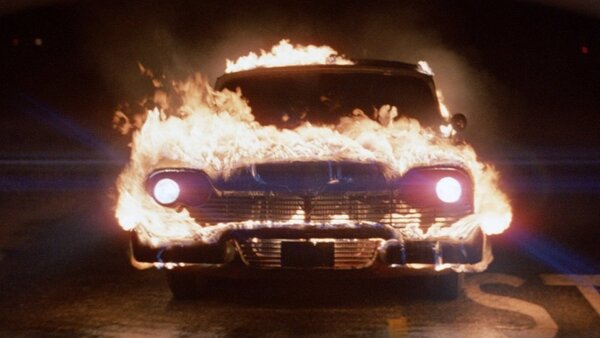Why CHRISTINE Is Secretly The Best Stephen King Movie
Christine - Hope & Doom In The Films Of John Carpenter

What we're left with, then, is something that could almost sound like an unwinnable choice - rusting malaise or violent history. If such a question is presented, then it is quickly resolved in the ending, which consigns Christine to an ironic fate. With Arnie fully in his car's thrall and having killed his high school bullies, plus his unfortunate boss Darnell (played by the brilliant Bob Prosky), Dennis and Leigh decide enough is enough and lure Christine to Darnell's auto shop, where they plan to kill her. Their tool of choice is a rusty old bulldozer - Darnell's interior proving a fitting grave where it had once given life.
Carpenter again lays on the juxtaposition with this sequence - Christine, glossed up and her motor purring, meets her maker against a hulking, diesel-spewing instrument of destruction. Just as pronounced are all the psychosexual dynamics wrapped up in Arnie's relationship with Christine, the former's death manifesting like a kind of sensual release, but even with that dark ending the film - perhaps unusually, for Carpenter - concludes on a somewhat spirited note.
Christine is pulverised by Dennis and crushed into a cube, with Arnie's old friend attending the car's funeral alongside Leigh and Detective Jenkins (an always great Harry Dean Stanton). Carpenter hints at the car living on with the presence of another fifties rock song, only for it to be revealed that a junkyard employee is playing a radio nearby. Our protagonists begin to rest easy, only for the frame to linger on Christine's mangled corpse, and for her grille to start moving.
This conclusion could be seen as typical of Carpenter's filmography - a nihilistic note that reiterates how evil lives on despite our best efforts, like with Halloween, or that we're all basically doomed regardless, as seen with The Thing. But emphasis should be placed on the means of Christine's destruction. There's a real sense of angst with regards to how decay is presented in the film, the seventies a pallid, cold contrast to that warming fifties glow seen at the beginning, but more anger is reserved for that nostalgia and those who cling onto it than the contemporary present. In that sense, the tools behind Christine's death take on an almost playfully sardonic nature. Basically, yes, everything sucks, but even scraps are enough to vanquish a twisted memory.
It's an idea that aligns Christine more so with the anti-establishment vibes of Carpenter's action thrillers, specifically Escape from New York and They Live, than some of his earlier horror works. Arnie may be dead, and Christine may return to enact a new cycle of violence, but there's hope in that we might be able to live beyond the past, and destroy it if we have to.
[Article continues on next page...]